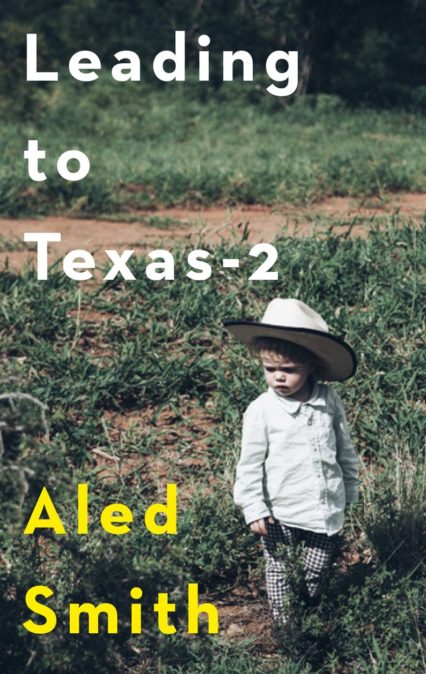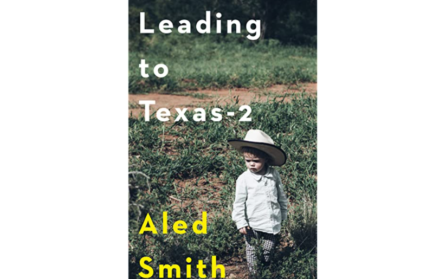Sion Tomos Owen reviews the debut novel from Aled Smith, the macabre black comedy of Leading to Texas-2.
With any new contemporary valleys-based novel, I find myself piecing together locations, descriptions and dialects, I don’t mean to, it’s just a default “Where you from ‘en?” mentality. But despite including some true historic events, a mash up of accents, and some relocated place names, Aled Smith has created a unique, unfamiliar, yet recognisable valley of dark comic-fiction in Leading to Texas-2. With a canon of valleys humour creating their own fictional towns, from Gwyn Thomas to Ron Berry, looking over its shoulder, this debut novel swigs from a much darker pint.
The author’s background in TV may have influenced his narrative style, which borrows from American film scripts down to switching inverted commas for dashes which lends itself to the sharp dialogue, excellently blending shock and humour.

It’s rare that I genuinely laugh out loud at a novel (real life LOLs), but so many of these passages had me in stitches. In what began like a similar trope of overtly foul-mouthed arguments in a run down back-of-beyond valley town, ‘The Oxytocin Stare‘ chapter is a hilarious and disturbing farce. Smith’s character naming is terrific; Hank, Wyatt, Cheyenne, Custer, “named by parents enthralled by the American West“. Pinky and Perky hidden in said chapter is a particular gem.
The backstory of how Cwmgarw became Texas 2 delivers a post-Gwyn Thomas journey through it’s origin as a proposition to turn an unemployed town into a cowboy theme park (which actually happened in in Blaenrhondda & Severn Sisters in the 80s) failed to capitalise on a valley desperate to hitch their hopes on anything after the loss of industry.
Cowboy Dan fled the valley. His ranch burned down and parents gradually started to name their babies in a more conventional fashion. There were some that still had the aspiration. He’d read only last year of a baby who’d been christened Tonto, but nowadays it was mostly a John or Janet.
The novel is richly textured and stuffed with memorable characters, with multiple overlapping and convergent plotlines of revenge, hopeless aspirations and the absurd caricature of violent Americanisation of modern lives. Smith’s greatest achievement is flipping the allegory of cultural appropriation on its head. While Texas-2 craved the American West, Cwmgarw actually boasts a history of US-bound emigrants, one which a Mormon couple from Utah discover while “fishing for family” as another US visitor attempts to rewrite it.
The fact that all of these poor dabs are working is refreshing, the fact that benefits/benefit fraud is only briefly mentioned is refreshing, the fact that only some of the characters are on drugs (prescription at least) is refreshing, and the fact that not all of them want to escape the valley is refreshing. Granted, each one is a grotesque caricature with the propensity to hurt one another in some shape or form, but at least it’s done with humour. I mean, who hasn’t lost their ability to pay back an arms dealer and decided to go on a shotgun slinging robbing spree just so they can pay off a dog they’re in love with?
Smith is always attempting to squeeze every last drop of comedy from a scene. The obese Mormons cram into a tiny car only to arrive at a rain-soaked petrol station as Boyd, the elusive ‘Valley Villain’, botches a robbery. Relishing the irony that the American ex-policeman and his wife are shocked at the violence they witness on this lonely mountain road, Smith piles on the humour in US size portions. Cheyenne, the young attendant with dreams of a boob job baffles the Valley Villain by melodramatically sobbing for the CCTV, before correcting herself:
“No, no hang on. That sounded funny didn’t it? Hang on. Let me do that again. THAT IS it, sir. Please don’t take me with you… was tha’ better?”
She keeps up the act to the astonished robber before asking to take her top off so she can perform better in the hope of getting the TV attention she craves when it’s replayed on the news, only to succumb to the heady mix of cartoon violence that kick starts a whole series of events.
The second plot line involves Chayenne’s boyfriend Hank, recently discovered epileptic and perpetually downtrodden, despised and unlucky: the quintessential loser. Smith finds the balance between despair and humour, literally in the gutter, in Hank’s angst, readily mocked and robbed during his epileptic fits. Hank stumbles in a dreamlike state of confusion, struggling with his new medication, navigating through his job as the most hated sports mascot in the valley and his visionary film script, which is been unwittingly sold to aggressive American investors by his in over-his-head partner Masaki.
Due to the thematic American narrative it’s hard not to find so many character comparisons to cinematic novels-turned-films. ‘The Dogman’ has the same elements of the macabre and grotesque as Macarthy’s Child of God; Hank and Masaki’s run-ins touch on Joe R. Lansdale’s comically violent Hap and Leonard capers as do sisters, Donna and Leanne’s feminist Thelma and Louise-esque revenge plans. The tightly worked plotlines snap into place and overlap in choppy chapters as if the reader is also visiting the town in search of the familiar.
And there is familiar here, despite the American influences. There are distinctly Welsh elements to each of these well-formed characters. Tash the hairdresser working out of her front room could be a hilarious homage to Clare Potter’s New Voices from Wales mini-documentary ‘The Mirror and the Wall’, replacing the poignant nostalgia and local gossip for exaggerated storytelling laced with casual racism. The interwoven stories of the characters in the ‘Mountain Meadows Motel’ chapter, each struggling with their own sexual, marital & business relationships, is recognisable as a key scene from a Tarantino film as it would be to people watching in a valleys club. One plot line sees a character descend into gnarled tragedy-fuelled gorefest, reminiscent of Niall Griffiths’ Ianto in Sheepshagger. Comparisons and homages are abound, yet this is a unique tale with a fresh Welsh angle, like the comic Stiffs did to the Zombie hunting genre, transplanting the Walking Dead to the Rhondda and throwing in a monkey.
Parthian have a history of finding and publishing fresh voices from the valleys, particularly storytellers who revel in dark humour. Also a great choice of editor in Carly Holmes, who shines in literary strange and horror writing, who may have lent her influence with the horror and macabre elements in some of the scenes.
Smith has written an excellent black comedy, exceptionally balancing the humour, horror and chaos of an overlapping plot to its climax. To paraphrase one of Smith’s creations,’These ere indeed his characters. The quick and the dead, the lost and found. His people. His black sheep.’ They are indeed, characters in a world that, hopefully, will return once more, since there’s plenty more of this new and vibrant landscape to be mined.
Leading to Texas-2 by Aled Smith is available now from Parthian
Sion Tomos Owen is an author, artist and presenter.











